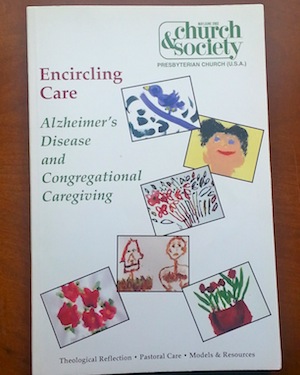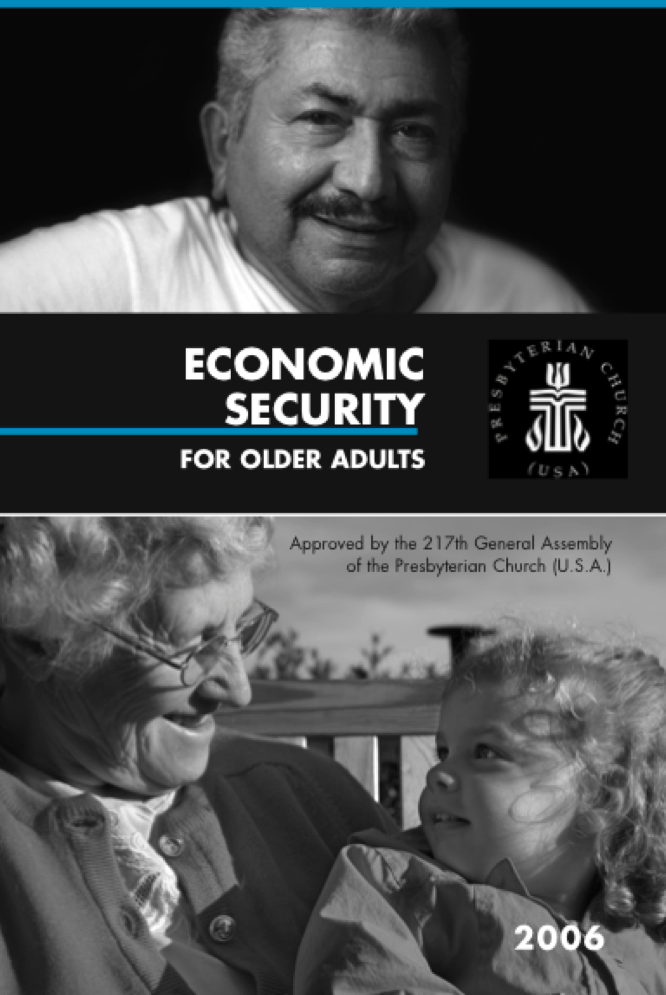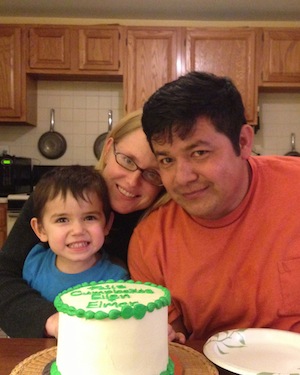Editor’s Note: This article was originally featured in the May/June 2003 issue of the print social witness magazine of the Presbyterian Church (U.S.A.), Church & Society. It is reprinted here as it originally appeared, with a few editor’s notes to where policy has changed, either within the Church or within the U.S. political system. We lift up this article in Unbound both to honor the social witness legacy of the PC(USA) through the years and because its teachings on how to advocate as a Christian – for health policy related to older adults and beyond – remains helpful and relevant in our present context.

by Carolynn Race
Originally appearing in Church & Society – May/June 2003
How can congregations care for older adults and caregivers? In addition to the caring provided by parish nurses, church committees, volunteer activities and pastoral care, congregations can care for older adults through advocacy.
By communicating their concerns, ideas, and recommendations regarding older adults with policymakers, individuals and congregations can have a tremendous impact on policy decisions. For example, a parish nurse team may notice that prescription drug costs for older adults in their congregation are too high – and could share that concern with their legislators. Likewise, a pastor could relay his or her concern about the treatment of people living with serious mental illness to his or her Member of Congress and recommend an appropriate government response. Whatever the issue, concerned Presbyterians are welcome to contact the Presbyterian Washington Office (now Office of Public Witness) for information about General Assembly policy on particular matters and/or to learn more about how best to connect with Members of Congress.
But is it the church’s role to advocate? By adopting a study entitled, Why and How the Church Makes a Social Policy Witness, the 205th General Assembly (1993) emphasized the importance of the church’s social witness policies and programs. Along with affirming that God alone is Lord of the conscience, the study affirmed, “The church, if it is to remain true to its biblical roots, theological heritage, and contemporary practice, must not fall silent. It must speak faithfully, truthfully, persuasively, humbly, boldly and urgently.” We are called to Speak Truth To Power.
___________________________________________
“The church, if it is to remain true to its biblical roots, theological heritage, and contemporary practice, must not fall silent. It must speak faithfully, truthfully, persuasively, humbly, boldly and urgently.” –Why and How the Church Makes a Social Witness Policy (2003)
___________________________________________
On health-related issues, the General Assembly has made a number of statements regarding advocacy – for the general population and for older adults more specifically.
- In 1971, the General Assembly of the UPCUSA called for a comprehensive system of health care in the U.S., recommending that “public financing be utilized simultaneously, both to facilitate access for every person to essential health care and to create a rational, well-organized, economical, and balanced health care system designed to service all persons adequately.” (Minutes, Part I, 593).
- In Life Abundant: Values, Choices and Health Care, a policy statement adopted by the 200th General Assembly (1988), the PCUSA urged congregations and sessions to organize for effective advocacy and participation in public policy formation and implementation efforts which affect the health of surrounding communities – including access to health care for poor persons, Medicaid standards, and proposals for improvement and reform of the health promotion and health care efforts of the United States.
- A Resolution on Christian Responsibility and a National Health Plan, which was approved by the 203rd General Assembly (1991), called ?for the nation’s legislative leadership to protect uninsured persons, especially those with low or fixed incomes, from erosion of health care benefits or an increase in cost of health care benefits and to expand Medicare and Medicaid benefits.
- The 2001 General Assembly directed the Office of the Stated Clerk of the General Assembly to advocate for the passage of the federal Mental Health Equitable Treatment Act co-sponsored by Senators Pete Domenici (R-NM) and the late Paul Wellstone (D-MN).
- In 2002, the 214th General Assembly adopted a resolution On Advocacy on Behalf of the Uninsured, which called on the Washington Office to encourage Members of Congress to recognize the importance of universal health care that is equal, accessible, affordable, and provides high-quality health care for all persons residing in our nation.
With that in mind, how can we care for older adults through advocacy? By exploring background information about Medicare, one legislative issue that impacts older adults, let’s look for possible advocacy strategies and resources for caregivers.
Medicare
Because so many Americans have expressed to Congress their concerns about the escalating cost of prescription drugs and the fact that Medicare does not include a prescription drug benefit, changes in Medicare are likely to be enacted by Congress this session. (Editor’s note: As this author predicts, Medicare Part D, signed into law in 2003, addresses many of the concerns raised in this paragraph.) The Kaiser Family Foundation notes that Medicare, which was enacted in 1965 to provide health and economic security to seniors, covers 41 million people (35 million older adults and 6 million under-65 people with disabilities). Medicare pays for hospital stays, physicians, and other medical services, but it does not cover outpatient prescription drugs or long-term care. In 2003, the federal government has allocated $269 billion in benefit payments, which represents 13% of the federal budget. Though many Medicare beneficiaries have additional insurance to assist with prescription drug costs, as of 1999, 38% lacked any prescription drug insurance (Laschober, et al., Health Affairs, February 2002).
 The Kaiser Family Foundation noted the following as key characteristics of the Medicare population:
The Kaiser Family Foundation noted the following as key characteristics of the Medicare population:
- Under age 65 – 11%
- Age 85+ – 9%
- Living in non-urban areas – 26%
- Self-assessed fair/poor health – 30%
- Cognitively impaired – 23%
- Income below 200% of poverty – 40%[1]
How to Advocate
How can you share your concerns about Medicare with your legislators? First, educate yourself about the issue.
- The Kaiser Family Foundation has a number of easy-to-read resources about Medicare and other health issues. Their resources are available online at www.kff.org.
- Ask members of your congregation about Medicare. For instance, how has the lack of a prescription drug benefit through Medicare impacted older adults? What do health care providers (nurses, doctors) think about Medicare and what suggestions would they make for improvement? What concerns and/or recommendations do family members of older adults have about long-term care and in-home care for older adults?
- Ask the Presbyterian Washington Office or the Office of Health Ministries (Editor’s Note: This office no longer exists. For this information, contact Office of Public Witness/Washington Office as listed above) about Presbyterian policies on Medicare and other health issues.
- Organize a study group in your congregation to share concerns about Medicare and talk about ways to be an advocate.
Next, decide what you want to share with your Member of Congress or your local legislator about Medicare.

- Focus on a specific issue. For example, choose to focus on prescription drug costs, lack of in-home nursing coverage, etc.
- Find a story of why that issue is a problem for you, your congregation, and/or your community. For instance, if you are most concerned about the cost of prescription drugs, think of a true story that explains your concern. Here is an example. “Jane Doe, who is a member of my congregation, has to spend over $3,000 on prescription drug coverage each year, and her annual income is less than $20,000. Because of the high cost of prescription drug coverage, she sometimes has to choose between other necessities, like heat and food, and purchasing prescription drugs.”
- Ask for something. What do you want your legislator to do about this situation? Before you talk with your legislator or a member of their staff, decide what you want from them. For example, if you’re concerned about the cost of long-term care, you may want to ask them to add long-term care as a benefit in Medicare.
Then, communicate your concerns with your legislator(s). After learning about the issue and outlining what you want to say, make contact with your legislator and share your concerns.
___________________________________________
Remember to thank your Member of Congress and/or their staff member, and follow up. Did they do what you wanted them to do? If so, thank them. If not, let them know that you noticed – and that you still urge them to do what you asked them to do.
___________________________________________
First, decide how you want to communicate with your legislator. You can communicate with legislators by telephone, e-mail, mail, fax, or?in person (at their local office or in Washington, DC). To find out more information about your Members of Congress, go to the Presbyterian Legislative Action Center, and enter your zip code.
Then, share your specific concern, your story, and ask for something. Before communicating with your Member of Congress or their staff, remember to:
- Educate yourself.
- Be succinct in your correspondence and/or your meeting.
- Make it personal.
- Ask your Representative for something.
Finally, remember to thank your Member of Congress and/or their staff member, and follow up. Did they do what you wanted them to do? If so, thank them. If not, let them know that you noticed – and that you still urge them to do what you asked them to do.
Resources
 If you have additional questions about how to advocate, please con- tact the PCUSA Washington Office at (202) 543-1126. For more information, check out the following resources:
If you have additional questions about how to advocate, please con- tact the PCUSA Washington Office at (202) 543-1126. For more information, check out the following resources:
- Washington Office resource “Holy Discontentment: Lifting Your Voice For Effective Advocacy”
- Join the Washington Office Mailing List to get more in-depth information on specific topics.
- Health Ministries USA (Editor’s Note: This office no longer exists)
- Kaiser Family Foundation
___________________________________________________
[1] 2000 federal poverty thresholds – Individuals 65+: $8,259/singles and $10,419/couples; Disabled persons under age 65: $8,959/singles and $11,590 couples.
AUTHOR BIO: Carolynn Race is the former Associate for Domestic Poverty and Environmental Issues for the Presbyterian Washington Office (Now the Office of Public Witness). Utilizing her Masters of Arts in Law and Diplomacy (Fletcher School of Law and Diplomacy, Tufts University, 2002), she advocated on behalf of PCUSA General Assembly policy with members of Congress and the Executive Branch. Specifically, she worked to advance policies in the areas of health care, domestic hunger and human needs, and environmental policy. She is a member of Western Presbyterian Church in Washington, DC.







Unbound Social